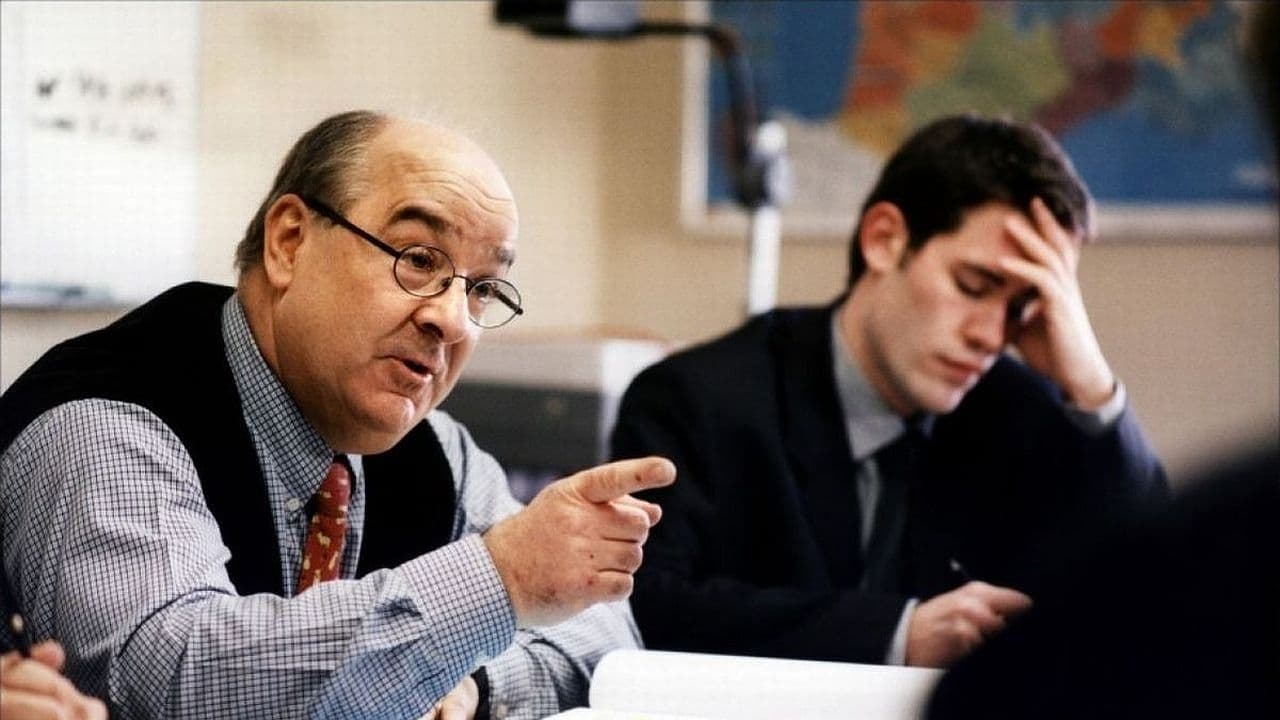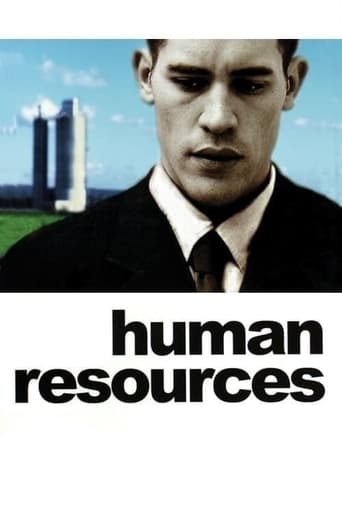Matcollis
This Movie Can Only Be Described With One Word.
Peereddi
I was totally surprised at how great this film.You could feel your paranoia rise as the film went on and as you gradually learned the details of the real situation.
Twilightfa
Watch something else. There are very few redeeming qualities to this film.
Casey Duggan
It’s sentimental, ridiculously long and only occasionally funny
Emil Bakkum
The film Resources Humaines is in essence a low-budget study on labor value. Director Cantet uses the scheme of class struggle for the portrayal of the relations between the blue- and white-collar workers in a production plant. The mutual feelings of stress are aggravated and perhaps even somewhat distorted by the father-son relation, that is woven into the story. In summary, the college graduate rationalizes the production process, and in passing makes his fathers job redundant. The factual narration itself is so simple, that there is plenty of room to delve into the many psychological facets. This allows for detailed character studies, and Cantet portrays them in sharp contrasting colors. The Bolshevist shop steward of the trade union (CGT) is against any alterations. The managing director is cunning in an unpleasant way. The workers are impassive as a result of their monotonous jobs. The son has the stupid arrogance of the new-born believer in dogmas. As a result the viewer has trouble in identifying with any of the characters. Obviously Cantet tries to sympathize with the blue-collars, but his preference is not supported by the events itself. The main weakness of the film is, that it appears half a century too late. In our postindustrial society the situation has been resolved, and is no longer a subject of debate. Today everybody knows, that a job will not last for life. Employees are obliged to engage in lifelong learning. We also appreciate, that work at the assembly line is so dull, that it is inhumane and should be automated as much as possible. The days of the laborers smashing the machines ended two centuries ago. So a sensible person can only welcome the intention of the managing director to hand over the repetitive tasks to robots. And the viewer looks at disbelief at the ensuing occupation of the plant by the workers, who reject any discharges. This behavior, that fitted in the fifties of the previous century (see for instance the nice film Made in Dagenham), is in our times a relic of the past. Resources Humaines suggests that political agitation and class struggle are more important than efficient production. The normal, modern and sensible act under these circumstances is of course starting negotiations between the management and the trade union in order to arrange decent social plans for the redundant personnel. We are also surprised by the promotion of the working week of 35 hours. Evidently Europeans have always valued their leisure time, but in recent years the emphasis has shifted to leave for duties with regard to caring (children, elderly) or for study. Or on part-time and flexible contracts. In conclusion, the film Resources Humaines is debating the wrong issues. If you appreciate films about labor, you may consider seeing my other reviews.
Howard Schumann
"You're not fired. You can stay. You're too young, too cheap to be unprofitable." -- Franck VerdeauLaurent Cantet's first film, Human Resources, shows the dehumanizing effect of mechanical labor on the relationship between a father and his son in rural France. The film has a strong political message but never feels sterile or preachy; rather it is a deeply felt human drama about class mobility. Jalil Lespert, the only professional actor in the cast, is Franck Verdeau, a young, handsome intern who works for the same company in which his father (Jean-Claude Vallod) has toiled for thirty years. Mr. Verdeau is a heavy-set taciturn individual who operates an automatic welding device that forces him to stand on his feet all day, bent over his machine and proudly claims that he can churn out 700 parts per hour. A member of the old school who does not believe in upsetting the bosses, the father is more compliant than most workers who still operate within the system but express their misgivings in union activity. Franck has just returned home from school in Paris. Eager to seize upon the opportunity presented to him through his father's sacrifice, he seeks to impress management and launch his career by assessing the validity of instituting a 35-hour workweek. Although he has made a good first impression on his shrewd boss (Lucien Longueville), he soon comes into conflict with union leaders who are fearful that reducing the amount of hours will lead to automation and loss of jobs. Torn between his professional obligations and his sympathies for the workers, Franck naively proposes a referendum of the workers on the issue. This plays into the hands of management seeking to drive a wedge between the workers and their union, led by firebrand activist, Danielle Arnoux (Danielle Melador). Arnoux, a real-life left-wing union activist, is an aggressive and uncompromising leader who does not hesitate to let management know exactly where she stands. When more layoffs seem to be forecast including that of his own father, Franck must choose sides between the militants and the father who made his job and career possible. Mr. Verdeau is opposed to the union and cannot see any benefit from a staggered workweek that would mean increased leisure. Their final confrontation about the father's passivity brings to the surface resentments about his father's social class that have been repressed for many years. Human Resources is shot inside an actual factory, creating an authenticity furthered by its cast of actual factory employees. I found myself deeply involved with the characters. In tackling an issue that Hollywood has stayed miles away from, Cantet has made us aware of the daily drudgery of millions of people around the world for whom compromise and submission is a way of life. The film never loses his focus, striking a balance between social relevance and a character study of deeply conflicted individuals whose work is reflected in their self-image. Cantet said in an interview, "The title Human Resources is a reaction against the cynicism of that expression. A human being is administered the same way you would administer stocks or capital. I wanted to play on that double meaning and go beyond coded administrative lingo in order to talk about an actual human's resources." He has succeeded impressively.
silverauk
This movie is very sober but realistic. The director Laurent Cantet uses non-professional actors in their natural environment which gives the movie a certain power less dramatic than "Norma Rae" but stronger in intensity. The scene where the father (Jean-Claude Vallod) shows to his son Franck (Jalil Lespert) the very simple work he is doing every day for years on is moving. There is also the conflict of the young manager Franck with the director (Lucien Longueville) which is characteristic for such social problems. The family-life is well depicted.
harry-76
"Ressources humaines" is a consideration of the tensions created between management and labor, as seen through the eyes of a business grad student serving as a temporary management trainee during his school break.
A proposed 35-hour work week is used as a dramatic charge for investigating both sides of white/blue collar concerns in a factory setting. After a strike is called by the workers, who feel betrayed by management, while management feels betrayed by its trainee who publicly discloses a "secret memo" on the pending firing of several workers, the film ends before a resolution is reached.Actually, it's not necessary to reveal the resolution, for that's not what the film appears to be about. While both sides feel their respective issues deeply, and both have seemingly legitimate arguments, at least to themselves, we witness what may actually be an absurdist comedy:Is the creation of a world of limitation a state of awareness that may in itself be spurious? Is the belief in lack a subconsious denial of human potential? Is the reacting to injustice an indvertent bonding of the actor to his own nemisis? Indeed, are not management and labor in effect merely different sides of the same coin? From a distant perspective, after "Ressources humaines" has unfolded and its passion and emotion subsided, we observe a dented sponge returning to its original shape. Nothing has really progressed, only temporarily allowed its profile to give. Yes, there is nothing to do in Laurent Cantet's world but to silently laugh at his sharp depiction of errors. Jalil Lespert as the student, Frank, and Jean-Claude as Le pere give mesmerizing performances.

